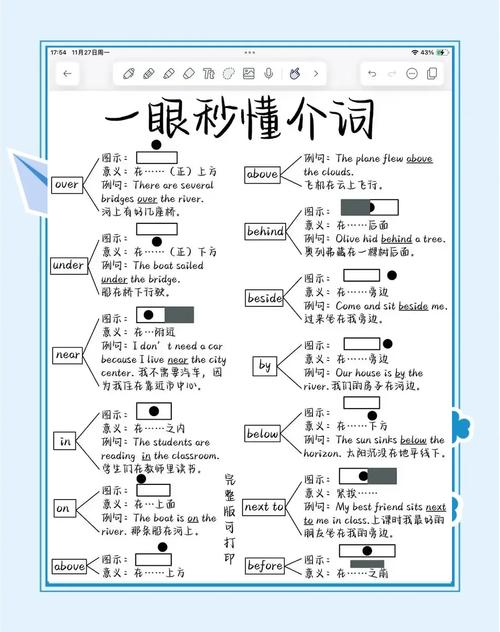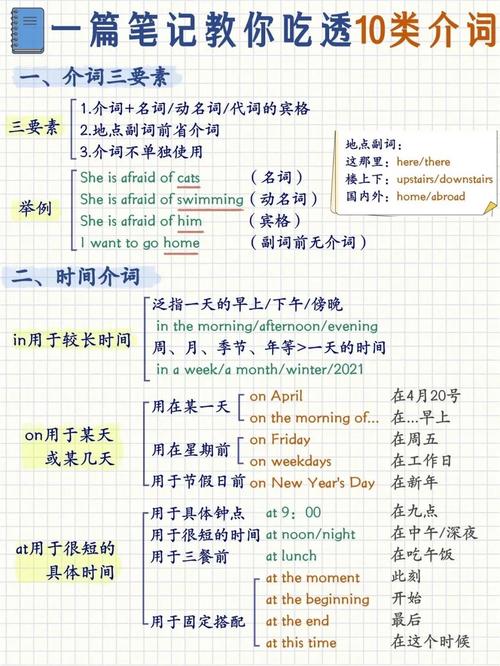英国人使用介词是英语语法中既基础又复杂的部分,介词虽小,却承载着表达时间、地点、方式、关系等多重功能,其用法灵活且常受语境、搭配及固定短语的影响,英国英语在介词使用上虽与美国英语大体一致,但也存在一些细微差别和独特习惯,掌握这些规律对准确表达至关重要。

时间介词:in、on、at的精准选择
时间介词的使用需结合“长、中、短”时间概念区分。in用于较长的时间段,如月份(in July)、季节(in spring)、年份(in 2023)、世纪(in the 21st century)以及泛指的上午/下午/晚上(in the morning);当时间点与“morning/afternoon/evening”连用且带有修饰词(如early、late)或具体日期时,仍用in(in the early morning)。on则用于具体某一天或特定日期,如星期几(on Monday)、日期(on May 1st)、节日(on Christmas Day)或特定 morning/afternoon/evening(on Sunday morning)。at聚焦于精确的时间点,如时刻(at 8 o'clock)、节日节点(at midnight)、年龄阶段(at the age of 18)或短暂动作(at the moment)。“I will arrive in London next week”(下周抵达伦敦,时间段),“She was born on a cold Monday”(寒冷的周一出生,具体日期),“The meeting starts at precisely 3 PM”(会议精确下午3点开始,时间点)。
地点介词:in、on、at的空间逻辑
地点介词的核心是“范围大小”和“接触方式”。in表示“在……内部”,用于封闭或有限空间(in the room、in China)、较大区域(in the park)或抽象领域(in love)。on强调“在……表面”,且表面与物体有接触(on the table、on the wall),也可用于街道(on Oxford Street)、交通工具(on the bus)或公共场合(on the beach)。at则指向“具体的点或位置”,如地点(at the station)、地址(at 10 Downing Street)、活动场所(at the cinema)或交叉路口(at the corner)。“The keys are in the drawer”(钥匙在抽屉内部,封闭空间),“The book is on the desk”(书在桌面,表面接触),“Wait for me at the entrance”(在入口等我,具体点)。
动态介词:to、into、onto的方向性
动态介词强调动作的方向性。to表示“朝向……目的地”,不强调是否到达(go to school、walk to the park)。into强调“从外到内”的进入动作(jump into the water、put the keys into the bag),常与表示“进入”的动词连用。onto则强调“在……表面移动并停留”(climb onto the roof、jump onto the stage)。“She drove to the airport”(开车去机场,方向),“He poured the milk into the cup”(把牛奶倒进杯子,由外到内),“The cat jumped onto the sofa”(猫跳到沙发上,表面停留)。
其他高频介词用法
- for:表示目的(study for a test)、持续时间(for three hours)、对象(a gift for you)。
- with:工具(write with a pen)、伴随(with friends)、原因(with joy)。
- by:方式(by train)、作者(a book by Shakespeare)、被动语态执行者(written by him)。
- about:话题(talk about weather)、大约(about 5 o'clock)。
- of:所属(a friend of mine)、材质(made of wood)、think of idea)。
固定搭配与易错点
介词常与动词、形容词形成固定搭配,需单独记忆,动词+介词(look at、listen to、believe in);形容词+介词(afraid of、interested in、good at),易错点包括:home前不加介词(go home,非go to home);last/next前不加介词(next week,非in next week);this/that/each/every前不加介词(this morning,非in this morning),英国英语中,at the weekend比美式英语的on the weekend更常见;in hospital(英式,指住院)与美式in the hospital(在医院里)也有区别。

介词省略与冗余
在某些结构中,介词可省略(help me (to) do sth),但需注意固定搭配不可随意省略(wait for不可简化为wait),冗余介词则需避免,如“where to?”(非where to go)、“what about…?”(非what about to do…)。
相关问答FAQs
Q1:为什么英国人说“at the weekend”而美国人说“on the weekend”?
A1:这是英式英语与美式英语的典型差异,英式英语习惯用“at”表示“在周末”这一时间段,类似“at night”;而美式英语受“on the morning/afternoon”结构影响,使用“on”,两者均正确,只需根据语境选择。
Q2:如何区分“in bed”和“on the bed”?
A2:“in bed”表示“躺在床上睡觉或休息”,强调状态(如“I read in bed”);“on the bed”则指“在床的表面上”,强调位置(如“The cat is on the bed”),英式英语中,“in hospital”指“住院”,而美式英语需用“in the hospital”表示“在医院里”。


